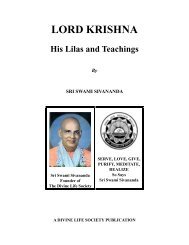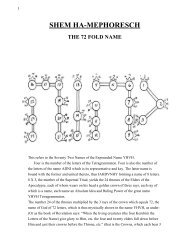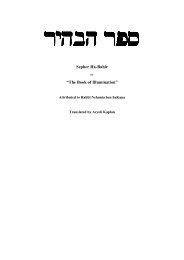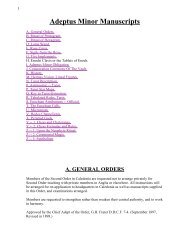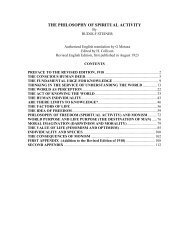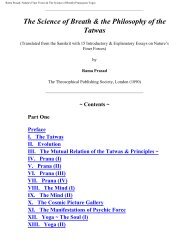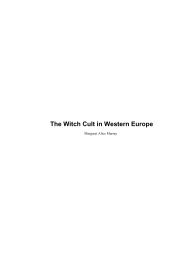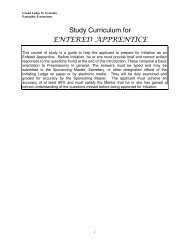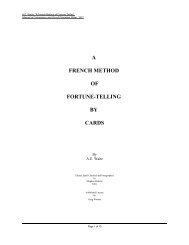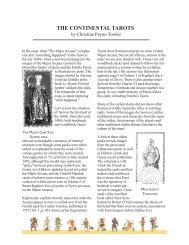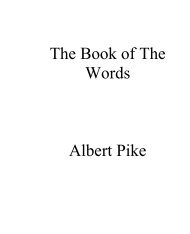Band 2 Anthropogenesis - H.P. Blavatsky
Band 2 Anthropogenesis - H.P. Blavatsky
Band 2 Anthropogenesis - H.P. Blavatsky
You also want an ePaper? Increase the reach of your titles
YUMPU automatically turns print PDFs into web optimized ePapers that Google loves.
The argument has never been met by the non-pantheistic Evolutionists. To say with Schmidt: "Forsooth are we to halt<br />
before the origin of language?" is an avowal of dogmatism and of speedy defeat. (Cf. his "Doctrine of Descent and<br />
Darwinism," p. 304.)<br />
We respect those men of science who, wise in their generation, say: "Prehistoric Past being utterly beyond our powers of<br />
direct observation, we are too honest, too devoted to the truth -- or what we regard as truth -- to speculate upon the<br />
unknown, giving out our unproven theories along with facts absolutely established in modern Science." . . . . "The<br />
borderland of (metaphysical) knowledge is best left to time, which is the best test as to truth" (A Modern Zoroastrian, p.<br />
136).<br />
This is a wise and an honest sentence in the mouth of a materialist. But when a Haeckel, after just saying that "historical<br />
events of<br />
------------------------------------------------------------------------<br />
[[Vol. 2, Page]] 663 PROOFS OF OUR "NOBLE DESCENT."<br />
past time . . " having "occurred many millions of years ago,* . . . are for ever removed from direct observation," and that<br />
neither geology nor phylogeny** can or will "rise to the position of a real exact science," then insists on the development<br />
of all organisms -- "from the lowest vertebrate to the highest, from Amphioxus to man" -- we ask for a weightier proof than<br />
he can give. Mere "empirical sources of knowledge," so extolled by the author of "Anthropogeny" -- when he has to be<br />
satisfied with the qualification for his own views -- are not competent to settle problems lying beyond their domain; nor is it<br />
the province of exact science to place any reliance on them.*** If "empirical" -- and Haeckel declares so himself<br />
repeatedly -- then they are no better, nor any more reliable, in the sight of exact research, when extended into the remote<br />
past, than our Occult teachings of the East, both having to be placed on quite the same level. Nor are his phylogenetic<br />
and palingenetic speculations treated in any better way by the real scientists, than are our cyclic repetitions of the<br />
evolution of the Great in the minor races, and the original order of evolutions. For the province of exact, real Science,<br />
materialistic though it be, is to carefully avoid anything like guess-work, speculation which cannot be verified; in short, all<br />
suppressio veri and all suggestio falsi. The business of the man of exact Science is to observe, each in his chosen<br />
department, the phenomena of nature; to record, tabulate, compare and classify the facts, down to the smallest minutiae<br />
which are presented to the observation of the senses with the help of all the exquisite mechanism that modern invention<br />
supplies, not by the aid of metaphysical flights of fancy. All that he has a legitimate right to do, is to correct by the<br />
assistance of physical instruments the<br />
[[Footnote(s)]] -------------------------------------------------<br />
* It thus appears that in its anxiety to prove our noble descent from the catarrhine "baboon," Haeckel's school has pushed<br />
the times of pre-historic man millions of years back. (See "Pedigree of Man," p. 273.) Occultists, render thanks to science<br />
for such corroboration of our claims!<br />
** This seems a poor compliment to pay Geology, which is not a speculative but as exact a science as astronomy -- save,<br />
perhaps its too risky chronological speculations. It is mainly a "Descriptive" as opposed to an "Abstract" Science.<br />
*** Such newly-coined words as "perigenesis of plastids," "plastidule Souls" (!), and others less comely, invented by<br />
Haeckel, may be very learned and correct in so far as they may express very graphically the ideas in his own vivid fancy.<br />
As a fact, however, they remain for his less imaginative colleagues painfully caenogenetic -- to use his own terminology;<br />
i.e., for true Science they are spurious speculations so long as they are derived from "empirical sources." Therefore,<br />
when he seeks to prove that "the origin of man from other mammals, and most directly from the catarrhine ape, is a<br />
deductive law that follows necessarily from the inductive law of the theory of descent" ("Anthropogeny," p. 392) -- his no<br />
less learned foes (du Bois-Reymond -- for one) have a right to see in this sentence a mere jugglery of words; a<br />
"testimonium paupertatis of natural science" -- as he himself complains, calling them, in return, ignoramuses (see<br />
"Pedigree of Man," Notes).<br />
------------------------------------------------------------------------<br />
[[Vol. 2, Page]] 664 THE SECRET DOCTRINE.<br />
defects or illusions of his own coarser vision, auditory powers, and other senses. He has no right to trespass on the<br />
grounds of metaphysics and psychology. His duty is to verify and to rectify all the facts that fall under his direct<br />
observation; to profit by the experiences and mistakes of the Past in endeavouring to trace the working of a certain<br />
concatenation of cause and effects, which, but only by its constant and unvarying repetition, may be called A LAW. This it<br />
is which a man of science is expected to do, if he would become a teacher of men and remain true to his original<br />
programme of natural or physical sciences. Any side-way path from this royal road becomes speculation.<br />
Instead of keeping to this, what does many a so-called man of science do in these days? He rushes into the domains of<br />
pure metaphysics, while deriding it. He delights in rash conclusions and calls it "a deductive law from the inductive law" of<br />
a theory based upon and drawn out of the depths of his own consciousness: that consciousness being perverted by, and<br />
honeycombed with, one-sided materialism. He attempts to explain the "origin" of things, which are yet embosomed only in<br />
his own conceptions. He attacks spiritual beliefs and religious traditions millenniums old, and denounces everything, save<br />
his own hobbies, as superstition. He suggests theories of the Universe, a Cosmogony developed by blind, mechanical<br />
forces of nature alone, far more miraculous and impossible than even one based upon the assumption of fiat lux out of<br />
nihil -- and tries to astonish the world by such a wild theory; which, being known to emanate from a scientific brain, is<br />
taken on blind faith as very scientific and the outcome of SCIENCE.<br />
Are those the opponents Occultism would dread? Most decidedly not. For such theories are no better treated by real (not<br />
empirical) Science than our own. Haeckel, hurt in his vanity by du Bois-Reymond, never tires of complaining publicly of<br />
the latter's onslaught on his fantastic theory of descent. Rhapsodizing on "the exceedingly rich storehouse of empirical<br />
evidence," he calls those "recognised physiologists" who oppose every speculation of his drawn from the said<br />
"storehouse" -- ignorant men. "If many men," he declares -- "and among them even some scientists of repute -- hold that<br />
the whole of phylogeny is a castle in the air, and genealogical trees (from monkeys?) are empty plays of phantasy, they



